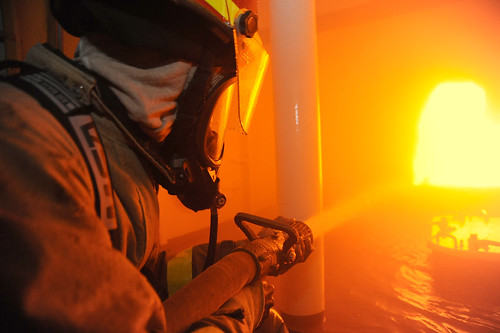During this last underway, an interesting new phrase was coined by the powers-that-be and used against a buddy of mine in my division: malicious ignorance. What is malicious ignorance, you ask? Well, let's see what Merriam-Webster has to say about these two words individually:
malicious (adj.) having or showing a desire to cause harm to someone : given to, marked by, or arising from malice
ignorance (n.) the state or fact of being ignorant : lack of knowledge, education, or awareness
Well, I guess it isn't the first time the military combined two words that contradict one another and coined it as a phrase. Terms such as military intelligence, government organization, friendly fire, active reserves, and tactical nuke come to mind. You see, having malicious intent implies that you are knowledgeable or aware of the dire consequences that are behind an action, and do said action anyways. You set the building on fire and laugh as it burns to the ground. Ignorance implies that you have no ill will, you were simply not aware of the consequences of an action. You forgot to turn off the oven and the building caught fire and burned to the ground (and you actually wanted to continue to live in that house -- no malicious negligence involved!).
 |
| Shipboard fire party nozzleman fighting a fire. |
Perhaps it was the Ship's Generator watch that lost one of his turbine generators to a hot condenser (which was caused by the watchstander not knowing what was going on in the first place), and then dropping his other turbine generator to a hot condenser when he secured seawater flow to the wrong machine, causing a subsequent loss of power to the ship and a scram of the only operating reactor. This massive fail caused a huge incident, but really the guy responsible got what is effectively a slap on the wrist: he got removed from standing watch and has to complete a (fairly extensive) knowledge upgrade. Such ignorance single-handedly delayed the underway by a day on both ends, yet he got off the hook pretty easily.
Maybe it was the reactor controls technician that destroyed a rod control power supply because he had no idea how to properly energize it for a reactor startup, costing the Navy hundreds of thousands of dollars in parts and hundreds of man-hours to repair it while simultaneously ensuring that we could not restart that reactor for about 20 hours. He wasn't maliciously ignorant -- he merely had to stay up all night to help repair the damage his ignorance had caused.
So, if you can catch a berthing compartment on fire, take down the entire plant with your incompetence, or completely destroy an expensive piece of equipment without malicious ignorance being involved, that means that the event that coined this phrase must be quite dire, indeed. Well, yes, it was quite dire. Quite dire, indeed.
 |
| This pretty much sums up how I feel about my job. |
Really, now? He wasn't doing anything wrong operationally, in fact he was supposed to operate that valve. It is a big deal because he was caught operating said valve "without any form of control whatsoever" by the RDMC (basically the senior enlisted guy in the department) and 3 MTT inspectors that were observing us.
Now, the nuclear Navy's "Point, Read, Think, Operate" policy is great for controlled evolutions or operations that are not done frequently, but it shouldn't be such a big deal for normal, routine operation, and if you are going to get caught violating PRTO it should be effectively a slap on the wrist. Instead, the guy that was caught was threatened with punitive action and the topic dominated discussion among the senior chain of command above everything else that happened.
If you are not in the nuclear Navy, this probably makes little sense, so here is a good analogy: it is like reading a newspaper with a front page headline of "MAN CAUGHT DRIVING WITHOUT WEARING SEATBELT" followed by a murder on page 3 and a bank robbery and page 7. That is one of the fundamental problems with the Navy -- you can be criminally incompetent at your job and not face any real trouble, but small benign issues that cause no real damage will jeopardize your career.
The only other eventful occurrence of the underway was the meet and greet by former Presidents George Bush and George Bush. They were on the ship for a whole 5 hours, and then they left. I didn't get a chance to participate, though, since I was busy. Anyways, more to come later.
じゃ、またね。

No comments:
Post a Comment